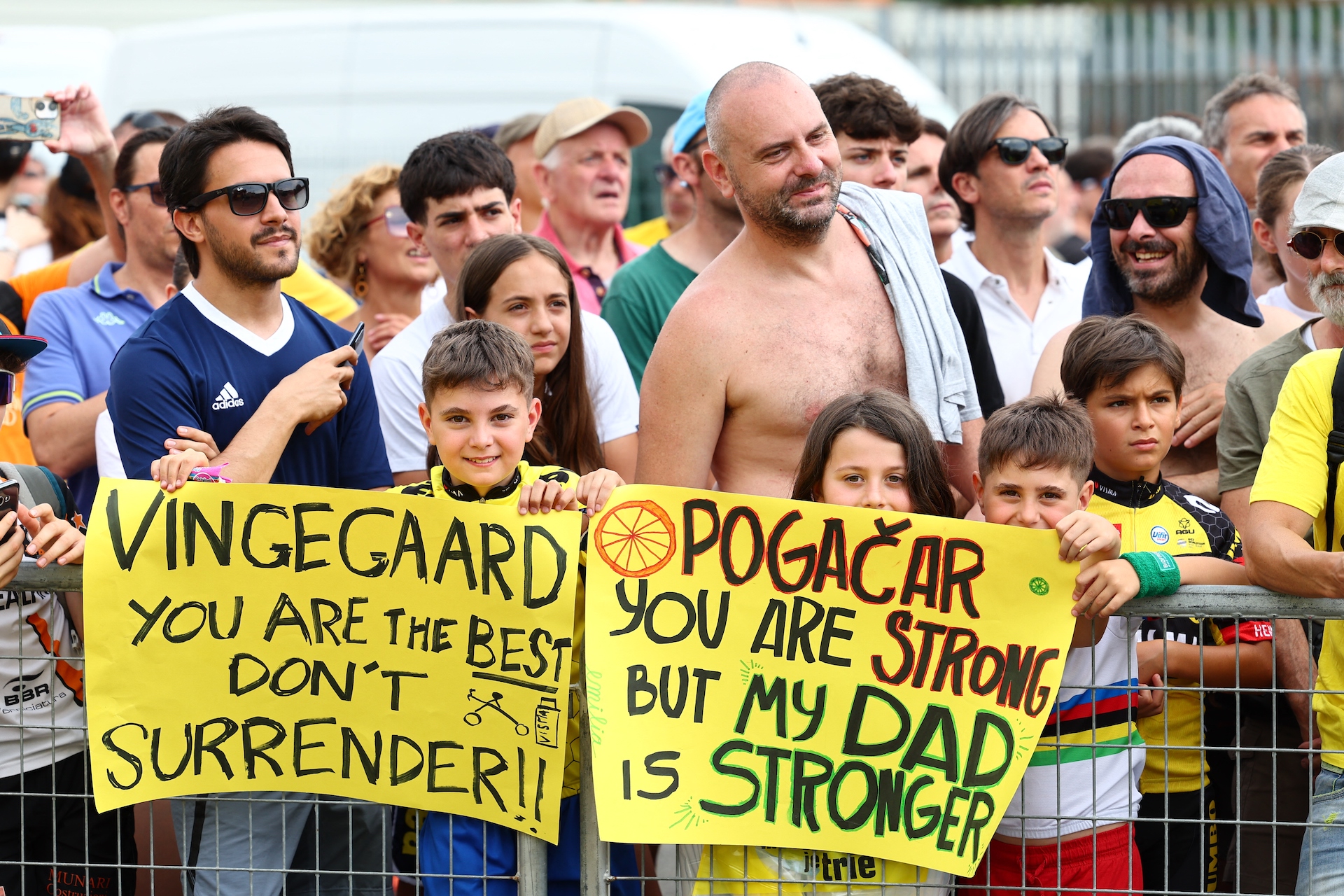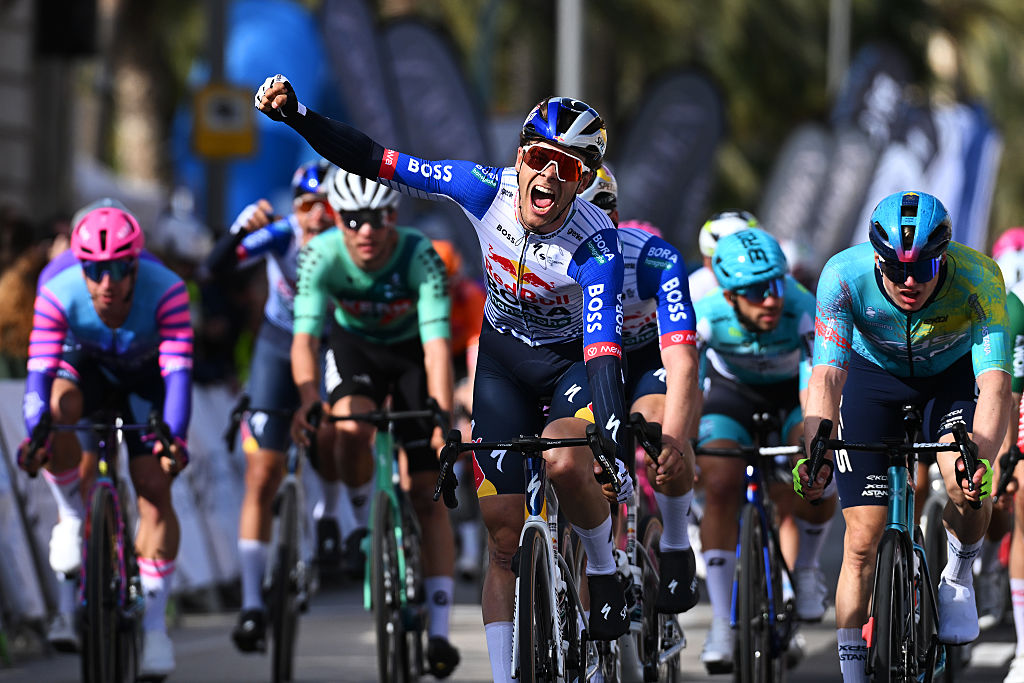High and Mighty: Pogačar vs Vingegaard is far from over – Philippa York analysis
With the Alps still to come this week, the battle for yellow is not done and dusted

Riders that win multiple Tour de France aren’t like the others – a pretty obvious statement in itself. What generally sets them apart, other than their ability to ride so fast that you can only wonder how they do it, is a self-belief that the race is never over. Even when they have received a major blow from a rival, they have the capacity to quickly move on from what happened to what they are going to do to recover the situation.
When Jonas Vingegaard beat Tadej Pogačar in a sprint finish at Le Lioran on stage 11, the momentum seemed to shift in favour of the defending champion. On that day, he was stronger than his rival and both he and Pogačar took that information and plotted the next clashes that awaited in the big mountains of the Pyrenees.
The Dane was fully buoyed up for the terrain that played to his strengths and Visma-Lease a Bike were prepared to follow their plan of taking the race to UAE Team Emirates. You could feel them thinking that they were on the comeback trail. Wout van Aert was back in the mix for the sprints and the team was paying proper attention when there was a hint of echelons. The yellow jersey just might be weakening and they were going to exploit that at every opportunity. Pogačar's worst day wasn’t that bad after all, but it could be a sign of Giro fatigue. Let the battle commence.
In the Yellow corner was Tadej Pogačar, mulling over where he went wrong that day. Pride slightly dented, he knew whatever had occurred in those final kilometres on stage 11 wouldn’t happen again. But crucially he didn’t show it, he let Visma enjoy their limelight on the two sprint stages on the way to Pau, happy that his teammates were relieved of some responsibility.
Sure enough, UAE imposed a semi-somnolent pace whilst climbing the Tourmalet and Hourquette d’Ancizan with a surprising 50 or 60 riders still in the peloton regrouping after the descent. As they headed towards the showdown that was going to take place on the slopes of Pla d’Adet, Vingegaard had to be thinking they were cooked. Fearful perhaps.
When the finale began, all talk of capitulation disappeared, Joao Almeida setting a tempo where the only moves were the ones out the back door of the GC group. Everyone was on their limit. Then Pogačar sent Adam Yates on the attack to see what Visma and Vingegaard would do, or rather could do. The classic bridge across to your teammate move provided an answer 3km later. On the terrain that allegedly would expose Pogačar’s demise, it was Vingegaard who was on the ropes. Yates did what he could for a minute or so and then the yellow jersey stomped off to the stage win, whilst in his wake everyone including Vingegaard was mouth agape. Forty seconds lost by the Dane, now Pogačar’s lead was almost two minutes, the GC hierarchy apparent in the time gaps.
And this is where the ego, ambition and fight that those TdF champions nurture re-appeared. ‘It’s still not over, tomorrow is another day, I felt good but Tadej was a bit better’ were the replies from Vingegaard. Of course, he would say that as they had a plan for the Sunday.
The latest race content, interviews, features, reviews and expert buying guides, direct to your inbox!
All in before the rest day, psyched up by the thought of five mountains with Plateau de Beille to finish, Visma set their stall out immediately. UAE were willing to let the escape go and have an easier time, but their Dutch rivals were intent on making the stage as hard as possible. The escape was composed of those who can climb and, under normal circumstances, would have fought over the win, but for Vingegaard this was the test he needed.
Visma burned through their riders and then unleashed Matteo Jorgenson at the foot of the last climb. The 40 minutes that followed were spectacular, the young American’s style reminiscent of Miguel Indurain as the GC group hung on to his slipstream. Almeida wisely let go immediately. The others with more at stake tried for longer, but when Vingegaard sensed his teammate was slowing with just over 10km remaining he attacked and began the Yellow Jersey test.
At first, Pogačar looked uncomfortable – not a grimace but mouth open and probably wondering how long Vingegaard could keep up that pace. Sometimes you watch riders going uphill and there’s no sense of speed. This was not one of them. This was properly fast and only achievable to the very few ultra-talented climbers. But gradually the edge came off Vingegaard’s rhythm and Pogačar knew he had things under control. A steeper section had his Visma rival out of the saddle just a little longer than usual, accompanied by a look back to check if it was hurting Pogačar enough. Pog read the body language, pounced and shot off up the road.
Compared to the previous day he even appeared less stressed, only looking to be at his complete maximum going into the final kilometre. In contrast, Vingegaard looked like he was hurting all over, Remco Evenepoel likewise. Behind the podium places emerged Mikel Landa for his best result, closely followed by the wise Almeida who stuck to his own speed when Jorgenson inflicted his damage lower down the climb. It seems like the mountain top finishes are keeping to the GC order more or less. The top three are settled barring accident.
It has been a disappointing second week for the French teams and riders: not a sniff of a stage win and they’ll take little comfort in Guillaume Martin moving up three places on GC to 20th position. I suppose they could say at least they are still in the race, unlike Roglič, Vlasov, Pidcock and co who have had to leave under varying circumstances.
There are a lot of tired bodies now in the race and they’ll be looking forward to a day in Gruissan Plage, the sea air bringing a certain amount of relief after the Pyrenees which have been as brutal as usual. There were proper star riders behind by 40 minutes and more on the Plateau de Beille, which shows how hard it was and the sprinters were in full survival mode the whole day.
Biniam Girmay looks to have sewn up the fight for the green jersey but there are two possible stages where the fast guys might get their chance. They may be troubled by the pesky breakaways though, as UAE won’t be that interested in controlling everything and Visma will be licking their wounds. That is until the Alps appear on the horizon and they have another plan.
Three minutes in arrears for a multiple Tour winner doesn’t mean it’s a foregone conclusion. Jonas Vingegaard said it himself, he had one of his best performances. It’s just that Pogačar had a better one. One bad day for Tadej and we will have a fight on our hands that will run all the way to Nice.
Get unlimited access to all of our coverage of the Tour de France - including breaking news and analysis reported by our journalists on the ground from every stage of the race as it happens and more. Find out more.
Philippa York is a long-standing Cyclingnews contributor, providing expert racing analysis. As one of the early British racers to take the plunge and relocate to France with the famed ACBB club in the 1980's, she was the inspiration for a generation of racing cyclists – and cycling fans – from the UK.
The Glaswegian gained a contract with Peugeot in 1980, making her Tour de France debut in 1983 and taking a solo win in Bagnères-de-Luchon in the Pyrenees, the mountain range which would prove a happy hunting ground throughout her Tour career.
The following year's race would prove to be one of her finest seasons, becoming the first rider from the UK to win the polka dot jersey at the Tour, whilst also becoming Britain's highest-ever placed GC finisher with 4th spot.
She finished runner-up at the Vuelta a España in 1985 and 1986, to Pedro Delgado and Álvaro Pino respectively, and at the Giro d'Italia in 1987. Stage race victories include the Volta a Catalunya (1985), Tour of Britain (1989) and Critérium du Dauphiné Libéré (1990). York retired from professional cycling as reigning British champion following the collapse of Le Groupement in 1995.

